



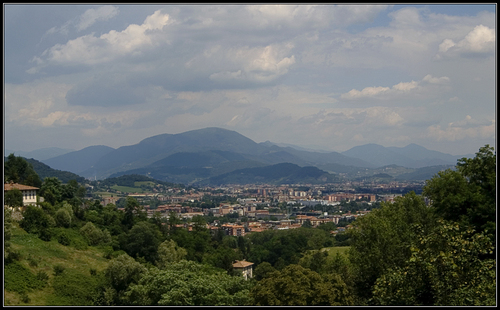 Bergamo
BergamoON one of the southern spurs of the Alps, overlooking the wide plain of Lombardy, towards the Apennines in the south, and with the soft tints of Monte Rosa in the west, at a height of some twelve hundred feet above the sea stands the city of Bergamo; a city, the origin of which dates from before the foundation of Rome, and which to this day contains one or two towers, which are of Roman, if not of earlier construction; a city, so ancient that its present name Bergamo, or as it is pronounced in the local patois "Bergham," being probably derived from the German Bergheim at the time of the Lombard occupation of Northern Italy, seems to be but a record of modern history.
The city itself is divided into two parts, the lower town on the level of the plain and the older upper town some 250 feet higher, now connected with the lower town by steep streets, in which are the palaces of the old local nobility, and, modern innovation, by a funiculi railway. The fortifications erected when Bergamo was a frontier city of the Venetian republic, still surround the old upper town, in the centre of which is the public square where stand the buildings which once contained the seat of government, also the cathedral, and by its side the far more important civic church of Santa Maria Maggiore, reminding us of such free towns as Lubeck, where the merchants determined to have, and did have, a bigger and a finer church than that of the Bishop.
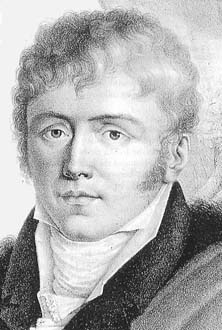 Mayr
MayrIt was in this city that in 1801 Antonio Piatti was born, he was connected with a musical family and was by profession a violin player, in which capacity he led the orchestra in Bergamo. His son, speaking of his powers of performance on his instrument, said "My father was a very good violin player, always in tune, but perhaps a little cold." Mayr, the conductor at Bergamo, gave Antonio Piatti a certificate that he could play so well as to make the public believe that it was Rovelli, then a recognised artist, who was performing. Whatever may have been his coldness in performance as a violin player there can be no doubt of the warmth of the blood that flowed in his veins, for he was married at the early age of nineteen to Marianna Marchetti, also a native of Bergamo, who was herself only fifteen at the time. The first issue of the marriage was Carlo Alfredo Piatti, who was born on the 8th of January 1822 at a house in the Via Borgo, Canale, a quaint old street in the upper town of Bergamo, about three or four doors from the house in which Gaetano Donizetti had been born. The house faces to the north in the direction of that country which was to be as dear to the great artist as his native land. Poor Alfredo (for we may at once drop the Carlo as Piatti never used it except in some formal documents and not even in his Italian will), did not long enjoy the comfort of a mother's love. She died at the age of seventeen when her second son was born.
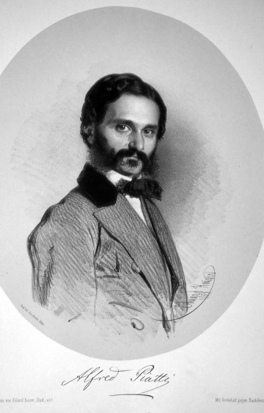 Piatti
PiattiThe young Alfredo commenced the study of his instrument at the early age of five, and the necessity for work was clearly put to him by his father who told him that if he did not play the violoncello he would have to be a cobbler. The child's master in Bergamo was his great uncle, Zanetti, who was at that time the principal 'cello player in the orchestra of the city, a good performer and a good musician.
For the purpose of his lessons, a viola di gamba by Gaspar di Salo which had been cut to a smaller size, was lent by the family Baglioni of Bergamo. The instrument still exists in the School of Music of the city a relic of the early days of the artist, who became, in later life, a director of the school, and of whom his native town is justly proud. This viola di gamba the boy had to carry from his father's house to that of his great uncle who also lived in the upper town, and on the way he had to cross the city square where boys were in the habit of playing marbles. The temptation was of course one which no boy could resist, and Alfredo would stand his instrument up in a corner of the square and join in the game. On one occasion during the game he heard a noise, turned round and saw two lads fighting, one of whom finding the viola di gamba a convenient weapon of attack had just struck his opponent on the head with such force that his head had gone right through the back of the instrument. It was of course useless for the boy to proceed to his uncle for a lesson on an instrument in such a state and there was therefore no course open to him but to return home; and, on the way, he said many Ave Marias that he might not be thrashed. Thrashed he was all the same. Happily the wounds both of player and instrument were healed with time in the one case and care in the other.
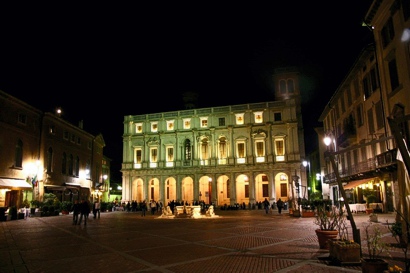 Piazza in Bergamo
Piazza in BergamoZanetti was already an old man when he commenced to teach his grand nephew, but Piatti has put on record that his uncle, who used to put his pupil on a chair on the table to receive his lesson, was very patient with him.
The ordinary difficulties of a student of the instrument appear, from his own account, never to have presented themselves to Piatti. And the easy mastery which has astonished more than one generation of musicians seems to have come to him almost naturally.
When Alfredo was seven years old his great uncle applied for permission for him to play with him in the orchestra of the theatre. The child was not to receive any fixed salary, but his uncle obtained from the Impresario a promise that he would make him a present at the end of the season. In this way Piatti played for three months; an engagement lasting forty nights. At the end of that time he received a present of ten francs from the Impresario of the theatre; but his uncle's wife said to her husband "you taught him, therefore you ought to have half the fee," and retained five francs out of the ten. There is no doubt that, even at that early age Piatti's services were worth a better fee than twopence a night for before the commencement of the next season the uncle died, and the boy Alfredo received a regular appointment as his successor in the orchestra of his native city.
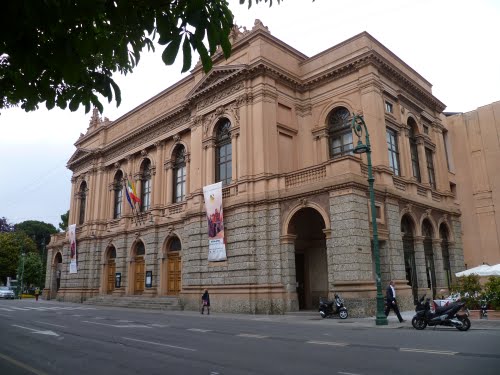 Bergamo Theatre
Bergamo TheatreWhen Piatti was thus engaged at the Opera at Bergamo, the chairs were too high for him, and he was therefore seated on the edge of the platform. It was the universal practice in Italy between the acts of the Opera to interpolate a lengthy Ballet so that the second part of the opera commonly commenced as late as eleven o'clock. For a child such performances were most exhausting. On one occasion while Madame Pasta was singing in Norma, in the last scene with Pollione, the air "In mia man al fin tu sei," one of the most touching numbers in the opera, the poor boy, who had fallen asleep, tumbled off his perch and broke his violoncello. Madame Pasta's performance was of course interrupted, but, far from showing any annoyance, she burst out laughing and afterwards generously gave the boy another instrument.
Every evening after the close of the performance Alfredo walked home, from the lower town to the upper town, holding his father's hand and fast asleep the whole way.
Piatti was of course best known to us in England as a quartet player. His quartet playing began at as early an age as his orchestral work. When he was a boy, Bergamo was a very musical town, and there were three or four families living in it at whose houses quartets used regularly to be played. On one occasion, when he was only six years old, before the death of Zanetti, he went with his uncle to one of these houses, and there heard a quartet, for the first time in his life. The boy looked over his uncle's part. He was surprised to hear people say that it was difficult, as it did not appear to be so to him; so much so that he exclaimed "I should like to play a quartet." His uncle told him that he was very impertinent, but the master of the house said "Oh, if he likes to play, let him play"; and Piatti played a quartet of Mozart, the first of his life long series of quartet performances. Later in life Piatti made the acquaintance of two sons of Mozart, of one in Vienna and of the other in Milan, but he said that neither of them displayed any talent for music.
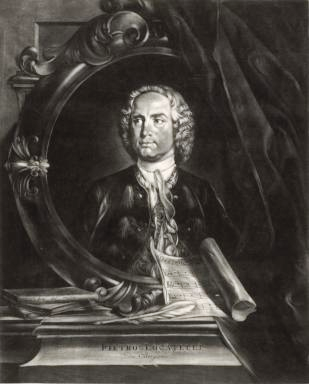 Locatelli
LocatelliThroughout his life all matters connected with music in his native town were of keen interest to Piatti. There are many persons of the name of Locatelli living in Bergamo, but Piatti could never discover any who claimed descent from the musician of that name; and even the fact that he was a native of Bergamo appeared to be unknown there and his fame unappreciated. Yet Locatelli was so esteemed in Amsterdam, where the latter part of his life was passed and where he died, that on the day of his funeral almost every shop in that city was closed.
Not the least of the services to music performed by Piatti in later life have been his editions of old music including several of Locatelli's Sonatas. "Locatelli," said Piatti, "must have been a great performer, for some of his music is very difficult, and I think that Paganini learnt much from him."
Piatti remained at Bergamo until he was ten years old. At that time Mayr, who was Maestro di Capella and at the head of the Music School of the city, seems to have had a special fondness for the boy and to have realized his genius.
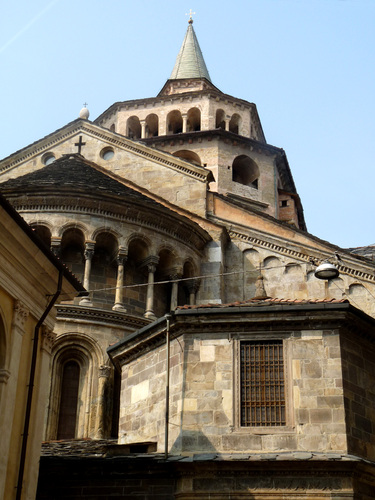 Santa Maria Maggiore, back
Santa Maria Maggiore, backMayr produced some seventy operas and a large number of masses, but it must be admitted that he not infrequently took subjects from works, including those of Beethoven, unknown in Bergamo. Mayr died at Bergamo, and on his monument in Santa Maria Maggiore has been engraved a passage from the Kyrie in one of his Masses. Unfortunately the passage thus selected for a lasting memorial is identical with the opening of Beethoven's Trio in C minor.
As an example of Mayr's appreciation of the young artist the following incident which occurred while the boy was in the orchestra of Bergamo may be told.
There was a great festival which lasted three days in the neighbouring village of Caravaggio. Four orchestras were engaged for the occasion, and these orchestras extended all round the church. Mayr conducted his music on the first day of the festival, Coccia on the second day, and Mercadante on the third. On the first day there was an incidental solo for the violoncello and Merighi, the professor of that instrument at the conservatoire in Milan, naturally expected that it would fall to him to play it. Mayr, however, signalled to the boy Piatti to play the solo.
Purchase the LPR recording of Piatti's works for solo cello here.